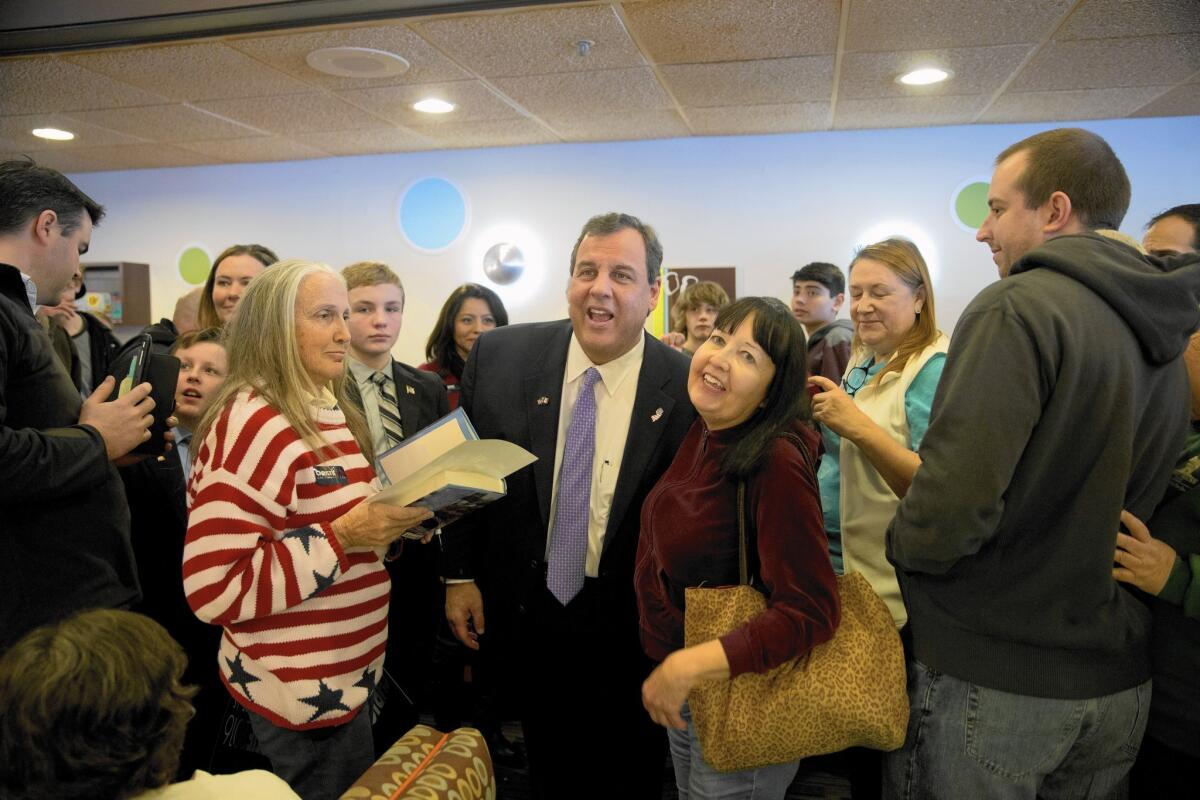Chris Christie, stumping for votes in Iowa, makes himself the center of his pitch

Reporting from SIOUX CITY, Iowa — In a dive bar on the western edge of the state, with scores of people huddled around him on a freezing night, the New Jersey governor best known for his tough-guy persona shared one of his most vulnerable moments.
Chris Christie talked about fearing for his wife’s life after the Sept. 11 terrorist attacks, when she was working near the World Trade Center and he couldn’t reach her on the phone until hours later.
“What am I going to do without my best friend?” he recalled wondering. “What kind of single dad am I going to be?”
It was just the first of the night’s confessions from the Republican presidential candidate. He admitted to having a bit of a crush on Adele. He joked about his weight. He talked about saying goodbye to his mother as she lay dying of lung cancer.
Each story, some of which have become staples of his campaign events, is another attempt to burrow into the hearts of Iowa voters just two weeks before the caucuses.
See more of our top stories on Facebook >>
In this primary, every Republican candidate sells something different — Donald Trump has anger, Ted Cruz has ideology, Jeb Bush has wonkishness.
Christie sells himself. Despite scandal and stumbles at home in New Jersey, his campaign appears to be a statement of faith that if enough voters just get to know him, he’ll have a shot at the White House.
“I’m like a fungus,” Christie said at one point. “I grow on people.”
It remains to be seen whether he can speed up the growth to break into the top tier of a crowded Republican field, but over the weekend in Iowa he treated every handshake as if it would make the difference between victory and defeat.
While making the rounds in a diner serving breakfast, Christie leaned into each conversation, his face sometimes inches away from voters. At campaign events, he can be almost the last person to leave the room, lingering until he takes a photo with anyone holding an outstretched smartphone.
“It’s old fashioned micro-targeting, one voter at a time,” said Brian Jones, a campaign advisor.
Christie’s event of choice is the “town hall,” often held in bars, where he stands in the center of the crowd and fields whatever questions are lobbed his way.
He spent years holding similar events around his state before running for president, producing the kind of YouTube-ready moments that made him a rising star in the Republican Party.
His political fortunes have waned since then. Even as he strikes a straight-talking image on the stump, he’s faced criticism for obfuscating previous positions that didn’t adhere to conservative dogma.
Sen. Marco Rubio of Florida, for example, dug out Christie’s statements of support for Common Core, education standards issued by the federal government. Christie rejected Rubio’s criticisms even as he welcomed it as evidence that he’s doing well enough to start drawing attacks from other candidates.
In fact, Christie is already making a general election pitch, saying his experience as governor in a blue state shows his ability to work cooperatively with Democrats. He’s touted changes to New Jersey’s teacher tenure rules and a more recent effort to boost drug treatment for nonviolent offenders.
Some of Christie’s initiatives have failed to live up to expectations. After successfully forging a deal to reduce retirement benefits for public employees — no small task in a place with heavy union influence — he reneged on the state’s obligation to pay into the pension fund when he faced a budget gap.
There have also been several bond rating downgrades, and job gains have not kept pace with the country as a whole.
“Tough talk. Weak record,” said a mailer circulated in New Hampshire by a super PAC supporting Ohio Gov. John Kasich.
Christie faces plummeting poll numbers in New Jersey — a Rutgers/Eagleton poll in December gave him a 33% approval rating, his lowest ever.
He downplayed the numbers when meeting with the Des Moines Register editorial board on Friday.
“Your current employer never likes it when you’re looking for a new job,” he said.
Besides, problems for Christie at home simply haven’t resonated with many Iowa voters.
TRAIL GUIDE: All the latest news on the 2016 presidential campaign >>
“I’m an Iowan, so I don’t pay a lot of attention to New Jersey’s record,” said Doug Wells, 62, whose family owns the ice cream parlor in Le Mars, where Christie spoke on Sunday.
The only mention of “Bridgegate,” the Christie administration scandal involving the closing of lanes approaching the George Washington Bridge into New York to allegedly punish a mayor for failing to endorse the governor, came from Christie himself.
When asked in Ames to describe a mistake he’s made and what he’s learned from it, Christie said he was too trusting of the people he hired.
Although investigations haven’t determined whether Christie was involved, “nonetheless, it happened on my watch,” he said.
The trials of two officials involved in the scandal are expected to begin in March, which could provide new fodder for his White House rivals.
Christie told Iowa voters he has the judgment to be president, and he asked for their faith as well as their vote. It’s an appealing message to voters who didn’t go to Christie’s events to glance over his resume.
“The reason to come and see someone is to shake his hand and look him in the eye, and take the measure of the person,” said Candi Roat, 63, of Sioux City.
She was one of many who walked away impressed from a Christie event.
James and Catharine Kramer, who gave their ages as “60-plus,” had been considering other candidates when they drove two hours to Le Mars on Sunday to hear Christie speak.
“This gentleman gave us the best hope for what we want,” Catharine Kramer said.
She left carrying a lawn sign.
Twitter: @chrismegerian
ALSO
With Iowa vote approaching, Bernie Sanders is gaining steam
Obama still might lose on immigration, no matter how the Supreme Court rules
The Latino vote is bigger and better educated than ever before, a new report finds
More to Read
Get the L.A. Times Politics newsletter
Deeply reported insights into legislation, politics and policy from Sacramento, Washington and beyond. In your inbox three times per week.
You may occasionally receive promotional content from the Los Angeles Times.











